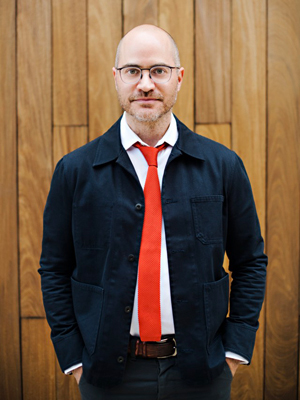Aaron Barth
M.A., Ph.D'09 (Philosophy)
By Erin Anderson, fourth year student in English and Writing Studies
Dr. Aaron Barth recently presented to a captive audience at TEDxKitchenerED about how e-learning can be made better. Barth says that having a virtual instructor delivering content in a way that mimics a traditional learning environment doesn’t reflect the wants and needs of users in today’s world, whether that’s in the boardroom or the classroom. Instead, he proposes a return to storytelling as the most effective means of transmitting information.
Barth and his core team of experts at Dialectic come from multi-disciplinary backgrounds, including filmmakers, a social scientist, a philosopher, marketing and graphic designers. Barth believes that while technology is important, there are certain gaps that Arts and Humanities graduates are uniquely well-suited to fill. “There’s a higher-level thinking that has to happen around any type of technology; we couldn’t do the work we do without that. That kind of conceptual thinking, that integration, is really a big part of those degrees. In particular the notion of meaning; questions of meaning are endemic of Arts and Humanities disciplines, and identifying meaning is a human skill,” says Barth. He strongly believes that as far as technology and AI have come, that “moving forward, there’s going to be a premium placed on the skills that humans are really good at which is that horizontal integration of ideas, being able to connect seemingly disparate ideas and concepts and make predictions and reason about things in that way, and that is the essence of philosophical reasoning and thought.”
 “E-learning gets a bad rap for good reasons [but] it can be done really well; everything people need is at their fingertips.”
“E-learning gets a bad rap for good reasons [but] it can be done really well; everything people need is at their fingertips.”
In fact, Barth credits his Philosophy training for much of his ability to be successful. “At the broadest level,” says Barth, “it allows people to think about the relationships between ideas. And those ideas could be about anything. Philosophy really taught me how to organize information: here are the basic principles and from those basic principles, these things follow. That really allows you to teach yourself anything and test your theories about the world.” Barth emphasizes the ability to apply critical thinking to ideas about everything from running a business, marketing, or even employee issues, which he says is so valuable because it leads to better problem-solving and decision-making.
Barth believes it takes courage to look at what you’ve been doing and admit to yourself when something isn’t working. For example, a client approached Dialectic for help creating an e-learning platform to replace their current module-based training that was essentially a three-hour information dump that was only accessible on desktop computers. The company had fairly good vanity metrics, says Barth, but how much value did that learning experience offer its users? True to form, Barth went directly to the source to find out what and how employees wanted to be learning. The response was overwhelming that what users wanted was something short and accessible from any device. They said, “We don’t need more information.” They wanted to know how they could communicate that information to stakeholders, which is a skill that can be practiced through simulations.
That shift in mindset resulted in an 830% increase in engagement with e-learning for that client in the first three months, and it also lent itself to the creation of Learning Snippets. Learning Snippets is an app designed for training employees on concepts such as diversity and inclusion. Barth references the concept of the Ebbinghaus forgetting curve—the idea that users forget approximately 60% of the information they’ve consumed within 20 minutes of learning it—when considering the shortcomings of traditional methods of e-learning. “We combat that with quick hits of learning over long periods of time…to extend and reinforce the new skills they’re training on. It’s sent directly to the user’s inbox so they can complete it whenever or wherever.” Knowing that scenarios are the best way to train people and having internal expertise in both technology and content, Barth says that the expansion made sense. He saw a market need for effective diversity training and saw it as a perfect values alignment for Dialectic. “Learning Snippets is distilling what Dialectic does really well into the smallest, most accessible package possible.” Barth says he and his team are excited because “it allows us to do really good work on important social issues and could really grow our business as well.”
The primary goal of communicating his ideas through an event like TEDxKitchenerED, for Barth, is to save people from bad e-learning, particularly when he has seen first-hand its effectiveness when it works. “E-learning gets a bad rap for good reasons [but] it can be done really well; everything people need is at their fingertips.”
Barth believes that if he’s able to teach himself anything, then he can turn around and teach that to others, an idea that’s really shaped his career. “I was looking for a way to build relationships with people within a team that I could create, but also with people that I could help. At the heart of it, teaching and learning is a relationship between the people who are trying to learn something new and the person who is trying to transfer information or skills. It just naturally led to thinking that maybe I can teach in those contexts and therefore generate the kind of relationships that meant a lot to me.”
Which is exactly what Barth and his team at Dialectic are doing. One TEDx at a time.
Aaron Barth, workplace science thought-leader and the founder and president of Dialectic, gives progressive leaders and HR directors the confidence they need to tackle their hardest people problems using scientific methods. He and his team of gifted scientists and designers have implemented interactive learning experiences for 50+ Canadian companies, revealing workplace barriers and mobilizing impactful strategies.





